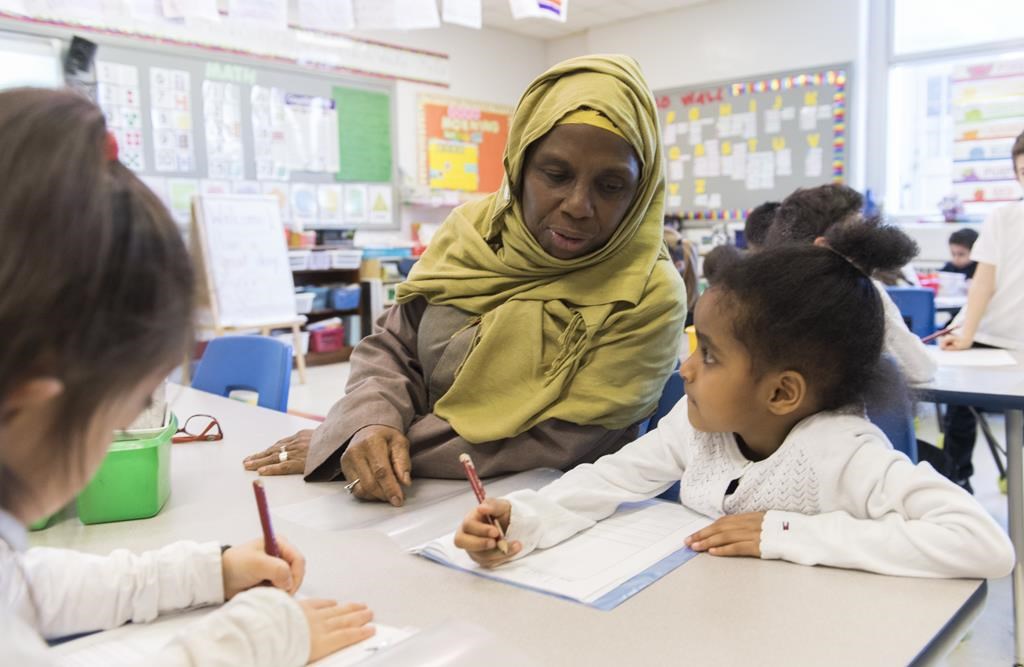Students require a neutral environment in which to learn and one where equality between men and women is put first, parents supporting Quebec’s secularism law testified in court Tuesday.

Nadia El-Mabrouk, a computer science professor at Université de Montréal, told the court that “wearing a religious sign — that shows a preference for a religion.”
“That influences children,” El-Mabrouk, who grew up Muslim in Algeria, testified. “And the religious education of children is up to parents.”
Last week, the court heard from four teachers — three Muslim and one Sikh — who testified that the law is discriminatory and has affected their ability to find work. Adopted in June 2019, Bill 21 bans certain government employees — including police officers, prosecutors and teachers — from wearing religions symbols while they are working.
For El-Mabrouk, the right of a teacher to wear a religious symbol shouldn’t be placed above the rights of children and their parents. Schools exist for children — not for teachers, she said. Students need to be protected from “any religious pressure and any religious proselytism,” she told the judge.
Veils and hijabs send the message that women have to cover their hair so they don’t arouse men, she said. “It’s a sexist message … and insulting for men as well as for women.” Men aren’t sexual predators, she added.
In several countries, El-Mabrouk said, women are fighting against laws that mandate they wear veils. The hijab, she continued, is viewed as a sign of virtuousness, and that puts pressure on women to wear it. She told the court that when she was in Algeria, she considered wearing a hijab, partly because of her beliefs but also because she feared the rise of political Islam.

It’s not rare for educators in Quebec to wear hijabs, she said, adding that at one point, nearly half of the staff at the daycare her children attended were veiled. “To keep the veil — even if it means losing your job — is a sign of religious fundamentalism,” she said.
Superior Court Justice Marc-André Blanchard told El-Mabrouk that he heard contradictions in her testimony. He asked how educators wearing religious symbols violated her freedom of conscience.
“It conveys religious values that are against my values, including equality between the sexes,” she replied.
The judge asked whether teaching about diversity and tolerance is part of the mission of educators.
- ‘Shock and disbelief’ after Manitoba school trustee’s Indigenous comments
- Canadian man dies during Texas Ironman event. His widow wants answers as to why
- Several baby products have been recalled by Health Canada. Here’s the list
- ‘Sciatica was gone’: hospital performs robot-assisted spinal surgery in Canadian first
She said she considers the veil to be derived from political Islam and that to respect diversity, it’s important to avoid offending people who have had difficult experiences with religion.
Teachers are a substitute for parents at school and represent authority, El-Mabrouk said. Crucifixes were removed from classrooms across Quebec, she said, adding that teachers must also demonstrate secular values.
François Dugré, a philosophy professor and the father of two children, told the court Tuesday that the legal debate around the secularism law has put too much emphasis on the rights of teachers and not enough on the rights of children.
Dugré said that even if a teacher wears a religious symbol in the classroom but isn’t actively proselytizing, freedom of thought and free discussion are hindered. “It doesn’t encourage certain debates,” he said.
The two witnesses said they have nothing against people who wear religious symbols. They argued, however, for religious neutrality in Quebec’s primary and secondary schools.
Quebec’s secularism law is being challenged by several groups. The hearings in Montreal combine four lawsuits challenging the law on the grounds it discriminates against religious minorities, particularly Muslim women.
The trial will continue Wednesday with testimony from experts called by the Quebec government.



Comments